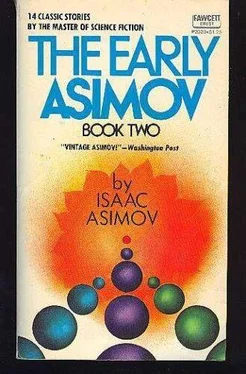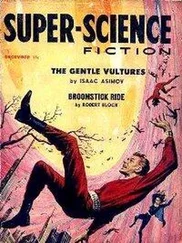Isaac Asimov - The Early Asimov. Volume 2
Здесь есть возможность читать онлайн «Isaac Asimov - The Early Asimov. Volume 2» весь текст электронной книги совершенно бесплатно (целиком полную версию без сокращений). В некоторых случаях можно слушать аудио, скачать через торрент в формате fb2 и присутствует краткое содержание. Год выпуска: 1986, ISBN: 1986, Издательство: Del Rey, Жанр: Фантастика и фэнтези, на английском языке. Описание произведения, (предисловие) а так же отзывы посетителей доступны на портале библиотеки ЛибКат.
- Название:The Early Asimov. Volume 2
- Автор:
- Издательство:Del Rey
- Жанр:
- Год:1986
- ISBN:ISBN: 034-532589-3
- Рейтинг книги:5 / 5. Голосов: 1
-
Избранное:Добавить в избранное
- Отзывы:
-
Ваша оценка:
- 100
- 1
- 2
- 3
- 4
- 5
The Early Asimov. Volume 2: краткое содержание, описание и аннотация
Предлагаем к чтению аннотацию, описание, краткое содержание или предисловие (зависит от того, что написал сам автор книги «The Early Asimov. Volume 2»). Если вы не нашли необходимую информацию о книге — напишите в комментариях, мы постараемся отыскать её.
The Early Asimov. Volume 2 — читать онлайн бесплатно полную книгу (весь текст) целиком
Ниже представлен текст книги, разбитый по страницам. Система сохранения места последней прочитанной страницы, позволяет с удобством читать онлайн бесплатно книгу «The Early Asimov. Volume 2», без необходимости каждый раз заново искать на чём Вы остановились. Поставьте закладку, и сможете в любой момент перейти на страницу, на которой закончили чтение.
Интервал:
Закладка:
I had better luck with Fred Pohl with another story, 'Super-Neutron,' which I wrote at the end of the same February in which I did 'Masks' and 'The Hazing.' I submitted it to him on March 3, 1941, and he accepted it on March 5.
By that time, less than three years after my first submission, I was clearly becoming rather impatient with rejections. At least, the news of the acceptance of 'Super-Neutron' is greeted in my diary with an 'It's about time I made a sale - five and a half weeks since the last one.'
Super-Neutron [9]
It was at the seventeenth meeting of the Honorable Society of Ananias that we got the greatest scare of our collective lives and consequently elected Gilbert Hayes to the office of Perpetual President.
The Society is not a large one. Before the election of Hayes there were only four of us: John Sebastian, Simon Murfree, Morris Levin and myself. On the first Sunday of every month we met at luncheon, and on these monthly occasions justified our Society's title by gambling the dinner check on our ability to lie.
It was quite a complicated process, with strict Parliamentary rules. One member spun a yarn each meeting as his turn came up, and two conditions had to be adhered to. His story had to be an outrageous, complicated, fantastic lie; and, it had to sound like the truth. Members were allowed to - and did -attack any and every point of the story by asking questions or demanding explanations.
Woe to the narrator who did not answer all questions immediately, or who, in answering, involved himself in a contradiction. The dinner-check was his! Financial loss was slight; but the disgrace was great.
And then came that seventeenth meeting - and Gilbert Hayes. Hayes was one of several non-members who attended occasionally to listen to the after-dinner whopper, paying his own check, and, of course, being forbidden to participate; but on this occasion he was the only one present aside from the regular members.
Dinner was over, I had been voted into the chair (it was my regular turn to preside), and the minutes had been read, when Hayes leaned forward and said quietly, 'I'd like a chance today, gentlemen.'
I frowned, 'In the eyes of the Society you are non-existent, Mr. Hayes. It is impossible for you to take part.'
'Then just let me make a statement,' he rejoined. The Solar System is coming to an end at exactly seventeen and a half minutes after two this afternoon.'
There was a devil of a stir, and I looked at the electric clock over the television receiver. It was 1.14 p.m.
I said hesitantly, 'If you have anything to substantiate that extraordinary statement, it should be most interesting. It is Mr. Levin's turn today, but if he is willing to waive it, and if the rest of the Society agrees -'
Levin smiled and nodded, and the others joined in.
I banged the gavel, 'Mr. Hayes has the floor.'
Hayes lit his cigar and gazed at it pensively. 'I have little more than an hour, gentlemen, but I'll start at the beginning -which is about fifteen years ago. At that time, though I've resigned since, I was an astrophysicist at Yerkes Observatory - young, but promising. I was hot on the trail of the solution to one of the perennial puzzles of astrophysics - the source of the cosmic rays - and full of ambition.'
He paused, and continued in a different tone, 'You know, it is strange that with all our scientific advance in the last two centuries we have never found either that mysterious source or the equally mysterious reason for the explosion of a star. They are the two eternal puzzles and we know as little about them today as we did in the days of Einstein, Eddington and Milli-kan.
'Still, as I say, I thought I had the cosmic ray by the tail, so I set out to check my ideas by observation, as for that I had to go out in space. It wasn't, however, as easy as all that. It was in 2129, you see, just after the last war, and the Observatory was about broke - as weren't we all?
'I made the best of it. I hired an old second-hand '07 model, piled my apparatus in and set out alone. What's more, I had to sneak out of port without clearance papers, not wishing to go through the red tape the occupation army would have put me through. It was illegal, but I wanted my data - so I headed out at a right angle to the ecliptic, in the direction of the South Celestial Pole, approximately, and left Sol a billion miles behind me.
'The voyage I made, and the data I collected are unimportant. I never reported one or the other. It was the planet I found that makes the story.'
At this point, Murfree raised those bushy eyebrows of his and grunted, 'I would like to warn the gentleman, Mr. Chairman. No member has yet escaped with his skin with the phony planet.'
Hayes smiled grimly, 'I'll take my chance. - To continue; it was on the eighteenth day of my trip that I first detected the planet, and as a little orange disc the size of a pea. Naturally, a planet in that region of space is something of a sensation. I headed for it; and immediately discovered that I had not even scratched the surface of that planet's queerness. To exist there at all was phenomenal - but it likewise possessed absolutely no gravitational field.'
Levin's wine-glass crashed to the floor. 'Mr. Chairman,' he gasped, 'I demand the gentleman's immediate disqualification. No mass can exist without distorting the space in its neighborhood and thus creating a gravitational field. He has made an impossible statement, and should therefore be disqualified.' His face was an angry red.
But Hayes held his hand up, 'I demand time, Mr. Chairman. The explanation will be forthcoming in due course. To make it now would only complicate things. Please, may I continue?'
I considered, 'In view of the nature of your story, I am disposed to be lenient. Delay is granted, but please remember that an explanation will be required eventually. You will lose without it.'
'All right,' said Hayes. 'For the present, you will have to accept my statement that the planet had no gravity at all. That is definite, for I had complete astronomical equipment upon my ship, and though my instruments were very sensitive, they registered a dead zero.
'It worked the other way around as well, for the planet was not affected by the gravity of other masses. Again, I stress the point that it was not affected at all. This I was not able to determine at the time, but subsequent observation over a period of years, showed that the planet was traveling in a straight-line orbit and at a constant speed. As it was well within the sun's influence, the fact that its orbit was neither elliptical nor hyperbolic, and that, though approaching the sun, it was not accelerating, showed definitely that it was independent of solar gravity.'
'Wait a while, Hayes.' Sebastian scowled till his gold premolar gleamed. 'What held this wonderful planet together? Without gravity, why didn't it break up and drift apart?'
'Sheer inertia, for one thing!' was the immediate retort. There was nothing to pull it apart. A collision with another body of comparable size might have done it - leaving out of consideration the possibility of the existence of some other binding force peculiar to the planet.'
He sighed and continued, 'That doesn't finish the properties of the body. Its red-orange color and its low reflective power, or albedo, set me on another track, and I made the astonishing discovery that the planet was entirely transparent to the whole electro-magnetic spectrum from radio waves to cosmic rays. It was only in the region of the red and yellow portion of the visible-light octave that it was reasonably opaque. Hence, its color.'
'Why was this?' demanded Murfree.
Hayes looked at me, 'That is an unreasonable question, Mr. Chairman. I maintain that I might as well be asked to explain why glass is entirely transparent to anything above or below the ultra-violet region, so that heat, light and X-rays pass through, while it remains opaque to ultra-violet light itself. This sort of thing is a property of the substance itself and must be accepted as such without explanation.'
Читать дальшеИнтервал:
Закладка:
Похожие книги на «The Early Asimov. Volume 2»
Представляем Вашему вниманию похожие книги на «The Early Asimov. Volume 2» списком для выбора. Мы отобрали схожую по названию и смыслу литературу в надежде предоставить читателям больше вариантов отыскать новые, интересные, ещё непрочитанные произведения.
Обсуждение, отзывы о книге «The Early Asimov. Volume 2» и просто собственные мнения читателей. Оставьте ваши комментарии, напишите, что Вы думаете о произведении, его смысле или главных героях. Укажите что конкретно понравилось, а что нет, и почему Вы так считаете.







